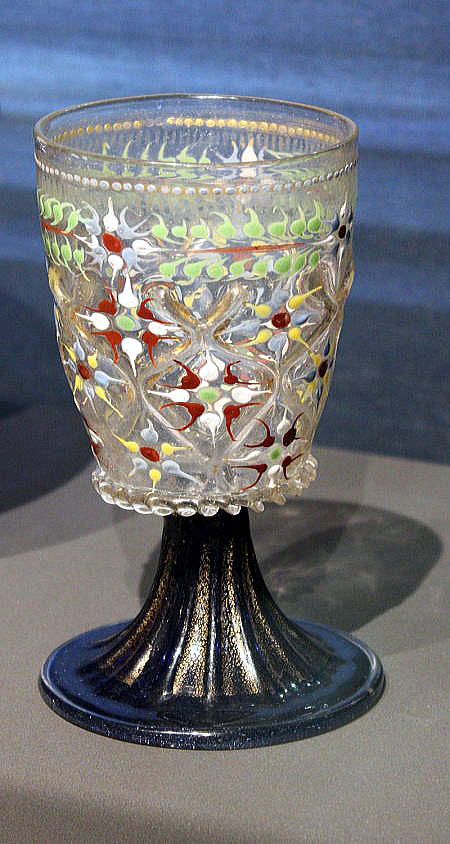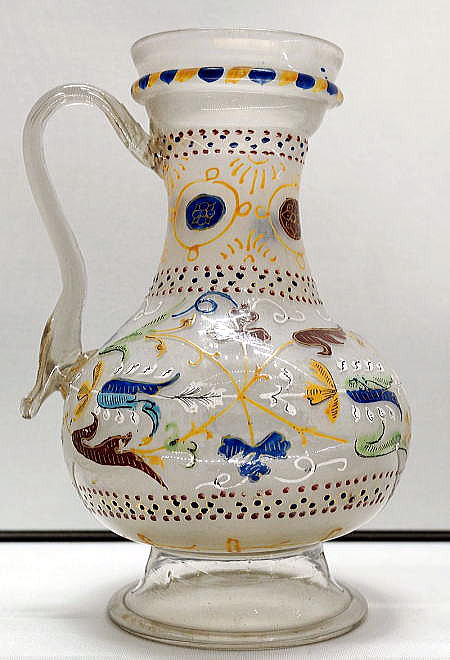| シルクロードの今を征く Now on the Silk Road ヴェネツィアン・グラス( Venetian glass)2 青山貞一 Teiichi Aoyama 池田こみち Komichi Ikeda 共編 掲載月日:2019年4月20日 独立系メディア E-wave Tokyo |
| <ヴェネツィア総合メニュー> <美術館3> ペギー・グッゲンハイム・コレクション ヴェネツィアン・グラス1 ヴェネツィアン・グラス2 ヴェネツィアン・グラス3 東洋美術館1 東洋美術館2 東洋美術館3 東洋美術館4 本稿の解説文は、現地調査に基づく開設に加え、Veneziaイタリア語版を中心にVenice英語版からの翻訳及び日本語版を使用しています。また写真は現地撮影分以外にWikimedlia Commons、さらに地図はグーグルマップ、グーグルストリートビューを使用しています。その他の引用に際しては、その都度引用名をつけています。 ◆ヴェネツィアン・グラス (Venetian glass)2  Venetian Glass Workers Source:Wikimedia Commons CC BY 3.0, Link  Baluster glass with lion-mask stems. White water glass and gold, Venice (or Venetian manner), late 16th century?early 17th century. Source:Wikimedia Commons パブリック・ドメイン, リンクによる  Source:Wikimedia Commons CC BY-SA 2.0 uk, Link  Goblet 1475-1510 Italy, Venice Glass with moulded, enamelled and gilded decoration The staple production of medieval and early Renaissance glassmakers was beakers and bottles. This splendid beaker on a high foot was made in Venice by the famous glass-blowers on the island of Murano. The decoration in gold leaf and painted enamels was applied after the piece had been shaped and gradually cooled. After decorating, the beaker went back into the mouth of the furnace, where the enamels would melt and fuse with the glass surface. Once fired, the enamels could not be rubbed off the surface. Source:Wikimedia Commons CC BY-SA 2.0 uk, Link  Early drinking glasses from Venice Source:Wikimedia Commons Public Domain, Link  Cameo from the British Museum. Tag on exhibit states: "Seven Sleepers of Ephesus cameo. the glass cameo from Venice depicts the Seven Sleepers of Ephesus. According to legend they were Christians who took refuge in a cave to escape persecution from the Roman emperor Decius (reigned AD 249-51). The cave was walled up but re-opened over 100 years later. The martyrs then miraculously emerged before returning to their final resting-place. About 1200-1300, Venice, Italy, Glass. PE OA 835 Given by Lord Northwick" See BM database entry for more details. Source:Wikimedia Commons CC BY-SA 3.0, Link  Chevron bead, Venetian. Source:Wikimedia Commons CC BY-SA 3.0, Link  Ewer. Gilt and enameled blown cristallo glass, Venice. Source:Wikimedia Commons Public Domain, Link  Stem glass. Gilt and enameled blown cristallo glass, Venice, late 15th?early 16th century. Source:Wikimedia Commons Public Domain, Link  Bell-shaped 16th-century Venetian-styled glass, called 'Duc d'Alfs Uitluiding'. Engraving by Frans van Bleyswyck, in Van Alkemade and Van der Schelling, Displegtigheden (1735) Source:Wikimedia Commons CC0, Link ヴェネツィアン・グラス3につづく |